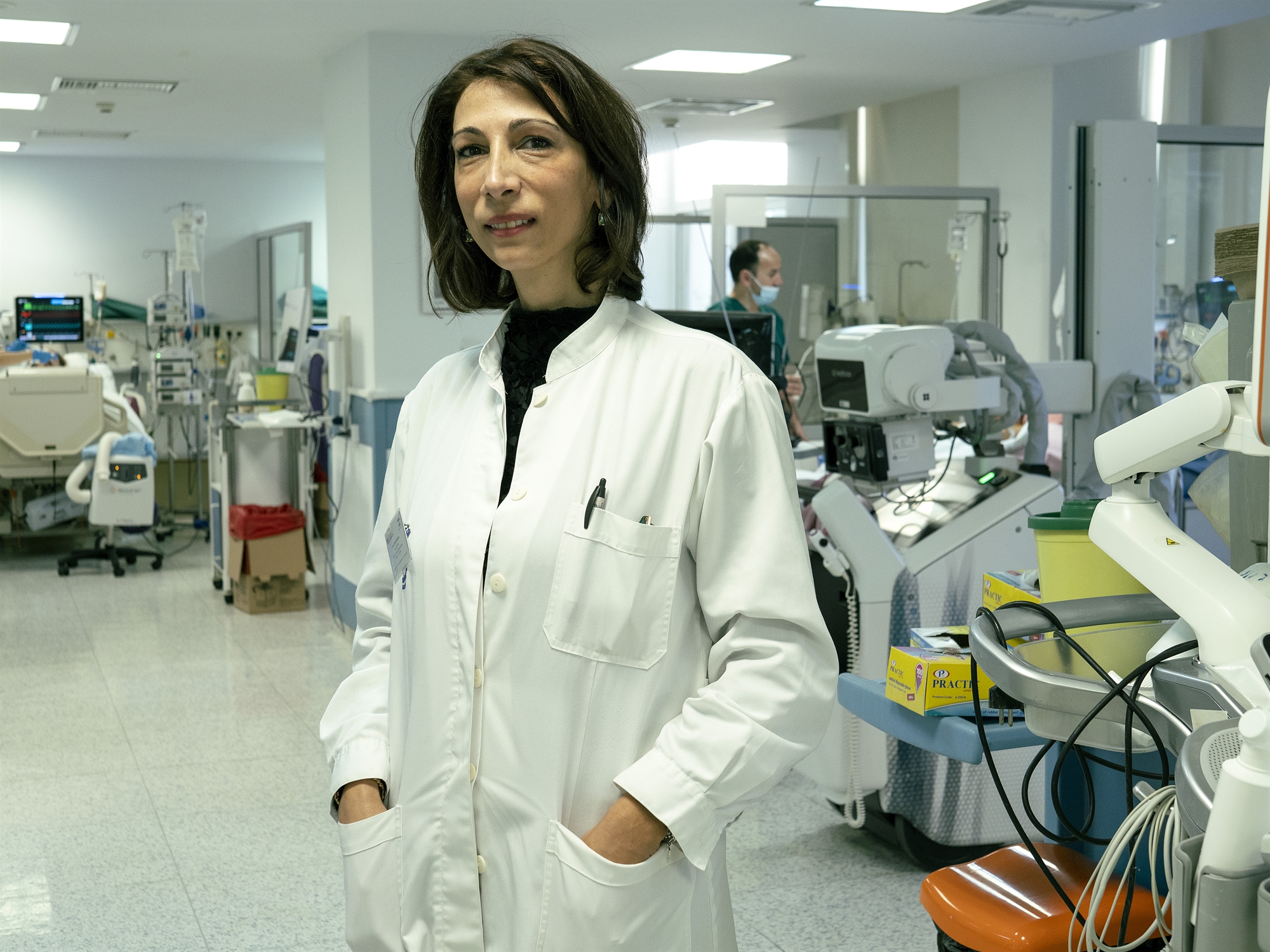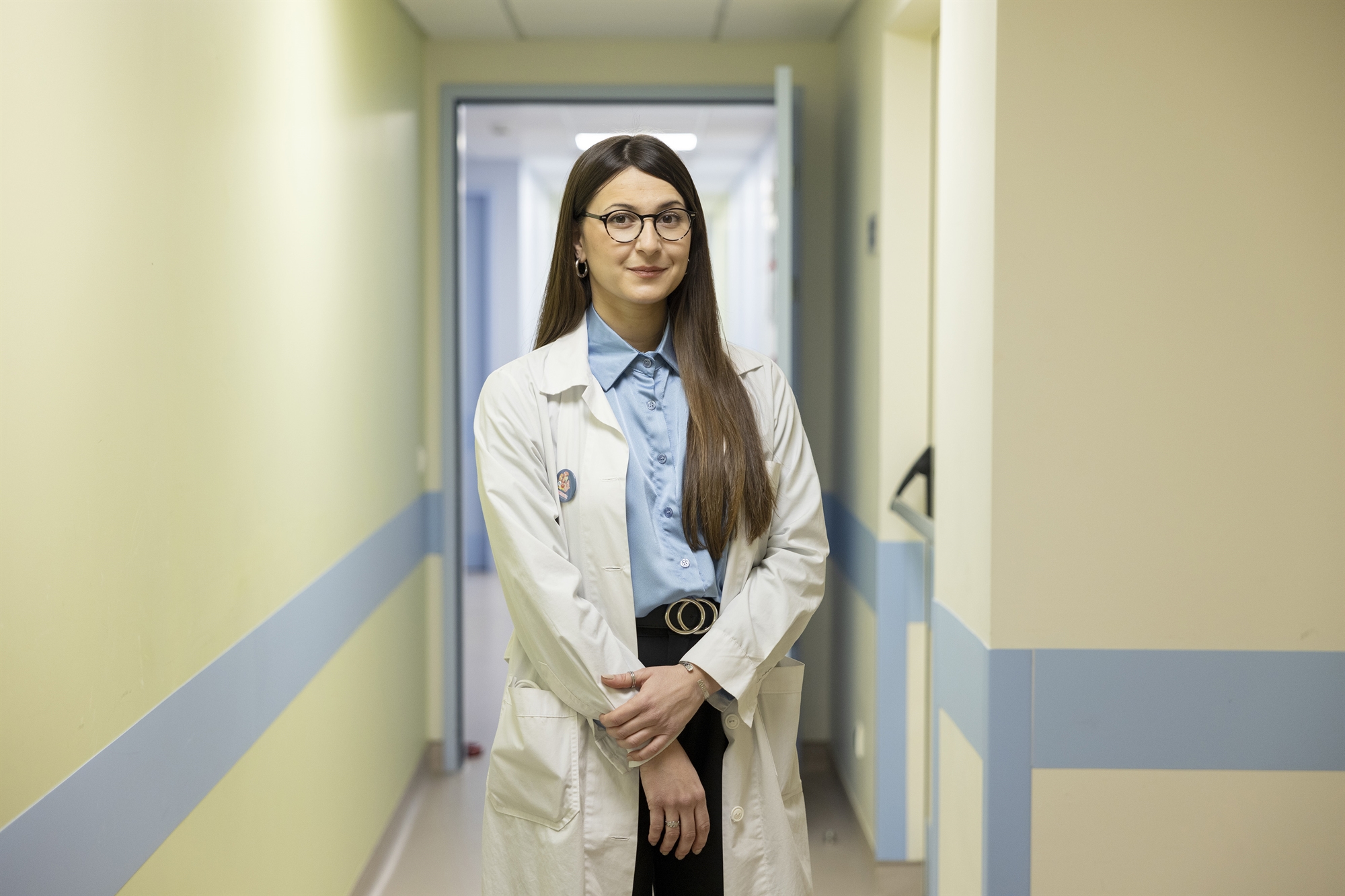
Her role is key. Every day, Fani Ploiarchopoulou will walk around the pine grounds of Sotiriya Hospital, visit various intensive care units and talk to doctors. Upon learning of a potential organ donor, a patient with catastrophic and irreversible brain damage diagnosed with brain death, he will coordinate all activities that may lead to organ donation and transplantation. He will seek the consent of relatives, organize tests and operations while the countdown is running. He is called upon to stage and supervise a multi-faceted, demanding choreography from beginning to end, so that there is not the slightest misstep and connect death with life.
“I don’t have an approach plan. Because each person in front of you is different, as is their pain. The pain is severe, especially with sudden incidents with young people. It is important to put yourself in the place of a relative, to be able to understand what he is going through. If the person in front of you understands what you are saying, you have few objections,” Ms. Ployarhopoulou says to “K” about the moments she tried to get her relatives’ consent. “You explain that through the loss they bring to the other person, this can also ease their pain.”
Since April 2022, Ms. Ployarhopoulou, Hepatologist Pathologist, has been working as Local Transplant Coordinator at Sotiriya Hospital. Her post is currently running as a pilot project through the National Organization for Transplantation (EOM) with funding from the Onassis Foundation. As part of the same project, since last year, four other local coordinators have been placed in the intensive care units of the KAT, Evangelismos, Ippokrateio hospitals in Thessaloniki and Ioannina University Hospital. Since last month, two more coordinators have been conducting pilot trials at Heraklion University Hospital and at Papanikolaou. The Ministry of Health’s draft law on transplantation provides for the creation of local coordinators with the task of advocating for organ donation.

This role has already been successfully tried in other places. In Spain, where it was first created, the number of organ donors now reaches 40 per million population per year. However, Greece is well behind the European average of 22 donors, even if thanks to a pilot application it managed to improve its ratio during the year: 6.6 donors in 2022, compared to 4.7 in 2021.
“Countries that have a sufficient number of transplants from deceased donors are countries that have established the role of a local transplant coordinator,” emphasizes Yuli Menudaku, Head of Transplant Coordination at the EOM. “In this way, caregivers are significantly relieved of duties that often go beyond their functions, while organ donation is officially included in the care protocols for patients in the intensive care unit,” he adds. “Imagine a doctor who updates his family on a daily basis about the progress of efforts to save his man, forced to change this overnight by informing them, along with death, saving the lives of other patients. It’s complicated. This role is now being taken over by local transplant coordinators.”
What are the problems and tasks of the local transplant coordinator? How does she overcome ignorance or any prejudice that may exist regarding organ donation? The two coordinators, who have been in this position for ten months, are talking to “K” for the first time.
6.6 organ donors per million population in 2022 in Greece. In 2021, the same figure was 4.7 donors per million population. There were 163 transplants from deceased donors last year, compared to 126 in 2021. In 2022, 170 brain deaths were reported and 90 were reported in 2021. 13 organ donors during January 2023, a number that approaches March in other years. In April 2022, 5 local transplant coordinators were placed as part of a pilot program in the intensive care units of KAT, Sotiria, Evangelismos, Hippocrates of Thessaloniki, University of Ioannina hospitals.
Katerina Tuplikioti is a nurse with six years of experience in various hospital neurology departments, operating rooms, anesthesia and intensive care units during the pandemic. Since last April, she has been the local transplant coordinator at the Hippocrates Hospital in Thessaloniki. “Building trust definitely requires empathy,” he says of trying to get consent from relatives of a deceased person to donate organs. “A conversation with them can last from a few minutes to many hours. We may have to meet again, call on the phone to disturb something. This decision should bring relief to the family, and it is our main task not to create additional stress at the most difficult time.”
They give families time, even 24 hours if necessary, to make a decision. “To ask a person at a time when he is suffering and in pain to act logically is paradoxical,” notes Ms. Ploiarchopoulou. That is why the transplant coordinators suggest that everyone discuss this with their people in an unexpected, “cold” time. In order to start on this path of thought, so that at a critical moment this proposal does not seem like an unprecedented idea, they have already processed it.
Before asking for consent, the attending physician must inform relatives of brain death. “Very often people confuse brain death with a vegetative state and coma, which are completely different things,” says Ms. Tuplikioti. Accordingly, Ms. Ploiarchopoulou explains that someone is brain dead when the function of the stem in the brain ceases, where the centers of respiration and movement of the heart are also located. This is an irreversible condition from which no one can recover, and now the organs of the deceased can only be mechanically maintained in the hospital for only a few more hours or days.
In the case of brain death, the certification process is overseen by a three-person panel of experts, which includes the attending physician, anesthetist, neurologist or neurosurgeon, but not the transplant team doctor. They run special “tests” to confirm brain death twice, at least eight hours apart.
After confirmation of brain death and the consent of the relatives, it is necessary to find out if the potential donor meets the basic requirements to continue the procedure. Below are the detailed surveys to be organized by the coordinator. “We will present all the trial data to the transplant teams who will decide if we can use these organs or not. At the same time, the deteriorating functions of the deceased should be artificially maintained in the few remaining 24 hours so that the organs remain in good condition,” explains Ms. Ploiarchopoulou.
All these months, she tried to make herself visible in the hospital, so that the rest of the medical and nursing staff would recognize her and familiarize her with her mission, because at some point she would need the help of many. “They need to be aware of my presence and know what to do when I need their help,” he says. “If I tell the blood donation department that we are in the process of organ donation and we need blood ‘now’, they must act immediately because I will have no other choice. If I told the pathologist that there would be an operation at three in the morning and in half an hour he would need to come for an express biopsy, I should have already prepared him. I must have given meaning to all these efforts that we are making and included all the employees.” Both coordinators who spoke to “K” comment on how supportive the managers and staff of the intensive care unit were in their work.

“Majority willing to donate”
Although the pilot program is not timed, Ms. Menudaku notes that early results are encouraging. “There is a significant increase in detected brain deaths and a doubling in the number of organ donors from local hospitals coordinating transplants. It is expected that as new coordinators gain experience, donations will increase,” he says.
“However, two very important findings are that the relatives of the deceased, if properly approached, generally agree to donate, and medical and paramedical staff provide special support in the donation procedures, as long as there is an appropriate person in their hospital.”
In Sotiria, as Ms. Ploiarchopoulou explains, ten years ago there was only one transplant. “This is not a hospital that deals with trauma or brain injury, it was not hospital-focused,” he says. However, over the past year, in seven cases, relatives accepted organ and tissue donations from their loved ones who died in the hospital. According to the latest EOM data, there were 13 organ donors as of January 2023, with numbers approaching around March in other years.
After identifying compatible recipients, the coordinators organize the operation. They will need to find a room, talk to paramedics and anesthesiologists, schedule times according to the capabilities of the various surgical teams that will be mobilized. Even the guards at the gate will be notified so that they immediately indicate to the brigades of transplants the area in which they should go, so that there is not the slightest delay.
Ms. Ploiarchopoulou recalls that in the first transplant, performed while she was the coordinator, organs and tissues from the donor went to the recipients in four different hospitals, and all these different medical teams had to be coordinated at the same time.
Throughout this complex process, K-speaking coordinators highlight the phase of communication with relatives. “It’s a fine line for all of us. It also charges you emotionally. However, I don’t feel like I’m asking for something from relatives, but at the moment I’m giving them the opportunity,” says Ms. Tuplikioti. Even after consent, if the families so desire, the coordinators keep them informed on how the next steps are going. “There is also a responsibility to the family that trusts us,” he adds. “It’s horrific to see afterwards that these families worry about whether transplants were used and ask if the organ recipients are doing well.”
Numbers
6.6 organ donors per million population in 2022 in Greece. In 2021, the same figure was 4.7 donors per million population.
163 transplants from deceased donors were performed last year against 126 in 2021.
170 brain death was reported in 2022 and there were 90 reports in 2021.
13 organ donors in January 2023, a number that approaches March in other years.
5 local transplant coordinators were placed in April 2022 as part of a pilot program in the intensive care units of hospitals KAT, Sotiria, Evangelismos, Hippocrates of Thessaloniki, University of Ioannina.
Source: Kathimerini
Ashley Bailey is a talented author and journalist known for her writing on trending topics. Currently working at 247 news reel, she brings readers fresh perspectives on current issues. With her well-researched and thought-provoking articles, she captures the zeitgeist and stays ahead of the latest trends. Ashley’s writing is a must-read for anyone interested in staying up-to-date with the latest developments.